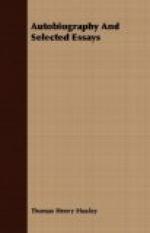[Footnote 84: Locke (1632-1704): an English philosopher of great influence. His chief work is An Essay Concerning Human Understanding.]
[Footnote 85: Franciscus Bacon sic cogitavit: thus Francis Bacon thought.]
THE METHOD OF SCIENTIFIC INVESTIGATION (1863)
[Footnote 86: The Method of Scientific Investigation is an extract from the third of six lectures given to workingmen on The Causes of the Phenomena of Organic Nature in Darwiniana.]
[Footnote 87: these terrible apparatus: apparatus is the form for both the singular and plural; apparatuses is another form for the plural.]
[Footnote 88: Incident in one of Moliere’s plays: the allusion is to the hero, M. Jourdain in the play, “La Bourgeois Gentilbomme.”]
[Footnote 89: these kind: modern writers regard kind as singular. Shakespeare treated it as a plural noun, as “These kind of knaves I knew.”]
[Footnote 90: Newton: cf. [Footnote 30].]
[Footnote 91: Laplace (1749-1827): a celebrated French astronomer and mathematician. He is best known for his theory of the formation of the planetary systems, the so-called “nebular hypothesis.” Until recently this hypothesis has generally been accepted in its main outlines. It is now being supplanted by the “Spiral Nebular Hypothesis” developed by Professors Moulton and Chamberlin of the University of Chicago. See Moulton’s Introduction to Astronomy, p. 463.]
ON THE PHYSICAL BASIS OF LIFE (1868)
[Footnote 92: On the Physical Basis of Life: from Methods and Results; also published in Lay Sermons, Addresses and Reviews. “The substance of this paper was contained in a discourse which was delivered in Edinburgh on the evening of Sunday, the 8th of November, 1868—being the first of a series of Sunday evening addresses upon non-theological topics, instituted by the Rev. J. Cranbrook. Some phrases, which could possess only a transitory and local interest, have been omitted; instead of the newspaper report of the Archbishop of York’s address, his Grace’s subsequently published pamphlet On the Limits of Philosophical inquiry is quoted, and I have, here and there, endeavoured to express my meaning more fully and clearly than I seem to have done in speaking—if I may judge by sundry criticisms upon what I am supposed to have said, which have appeared. But in substance, and, so far as my recollection serves, in form, what is here written corresponds with what was there said.”—Huxley.]
[Footnote 93: Finner whale: a name given to a whale which has a dorsal fin. A Finner whale commonly measures from 60 to 90 feet in length.]
[Footnote 94: A fortiori: with stronger reason: still more conclusively.]
[Footnote 95: well-known epigram: from Goethe’s Venetianische Epigramme. The following is a translation of the passage: Why do the people push each other and shout? They want to work for their living, bring forth children; and feed them as well as they possibly can. . . . No man can attain to more, however much he may pretend to the contrary.]




